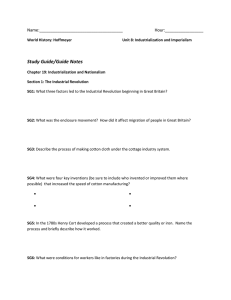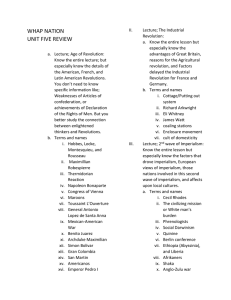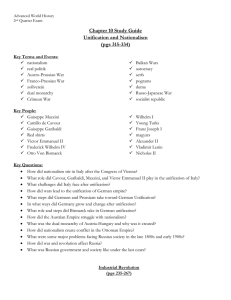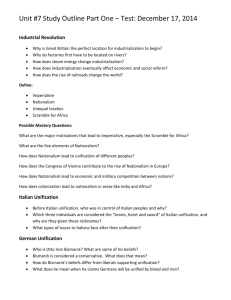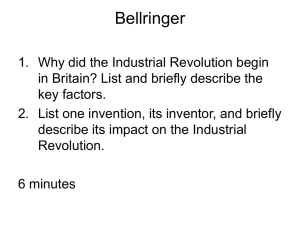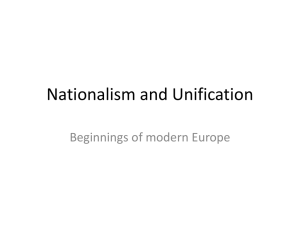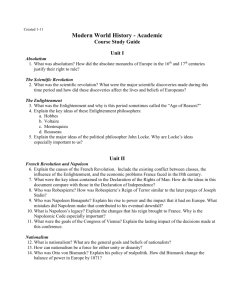Industrialization, Nationalism, and Imperialism
advertisement
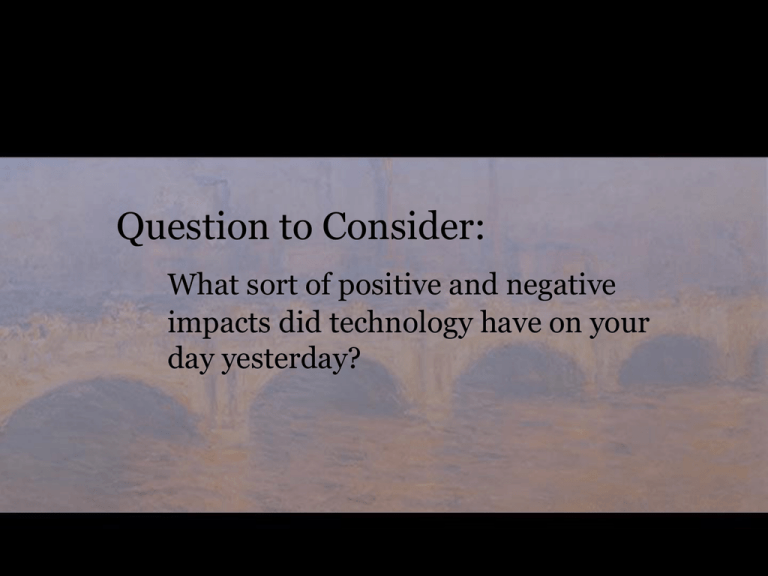
Question to Consider: What sort of positive and negative impacts did technology have on your day yesterday? Industrialization, Nationalism, and Imperialism Chapters 19-21 I. The Industrial Revolution • A rapid shift from an ECONOMY based on agriculture (farming) to one based on manufacturing (factories) Begins in Britain; factors included… • the spinning jenny – – – – – Increase in food supply (potato) Leads to growing population (need jobs) Entrepreneurs have money to spend Abundant natural resources (like..?) Large supply of markets around the world I. The Industrial Revolution • Began in Cotton Industry – Cottage industry • – Water-powered loom • – More efficient to bring worker to loom Steam Engine (James Watt) • Water-powered cotton mill Hand-made crafts at home Non-river factories growth of cities I. The Industrial Revolution • Railroads – Steam-powered locomotive, rails • • • • Factories – Rows of urban factories Faster transport = lower-priced goods New jobs in countryside & city Raw materials: Economic growth led to investment • • • • More sales led to more production More machines needed more workers Constant need created labor shifts Raw materials: I. The Industrial Revolution • Spread of Industry – – – Nations wanted to compete with Britain’s wealth Spread at different rates across Europe, U.S. Aided by pro-industry gov’t policies • Public works, infrastructure (?) I. The Industrial Revolution • Social Impact – Industry caused major urban growth • – Effects of overcrowding? Emergence of new social classes • Industrial Middle Class – • Owners of machines, markets Industrial Working Class – – – Factory workers Long hours, Low wages, dangerous conditions (?) Many women and young children (?) I. The Industrial Revolution • Benefits of Capitalism – Based on Enlightenment ideas of liberty, rationalism • – – – — Gov’t plays no role Not concerned with equality • continues class divisions • “rich get richer, poor stay poor” Competition pits people against each other • “survival of the fittest” Worker free to choose his or her work • Costs of Capitalism Private property Competition encourages efficiency & productivity • • — Cooperation not efficient Laissez-faire does not factor unemployment • i.e. Great Depression I. The Industrial Revolution • Social Impact – Birth of Socialism • • Gov’t owns some means of production Utopian socialists – – • Karl Marx Equality of all people Replace competition w/ cooperation Later socialists (Karl Marx) – – – – Above were impractical dreams Struggle would lead to revolution Dictatorship would organize society Ultimately, classless society emerges II. Balance of Power in Europe • Congress of Vienna – Held by Klemens von Metternich • – – – After defeat of Napoleon Goal: maintain stability of monarchy Split up territory to balance power • – Klemens von Metternich Austrian Foreign Minister No monarch could become dominant Principle of Legitimacy • Lawful monarchs would be restored to power after Napoleon to create peace. II. Balance of Power in Europe • Conservatism – Philosophy based on tradition and social stability • • • – Contain the forces of change Obedience to political authority Organized religion maintains stability Principle of Intervention • Great powers could send in armies to put down revolutions II. Balance of Power in Europe • Liberalism – – People should be as free as possible from governmental restraints Beliefs • • • • – Protection of civil liberties Religious toleration Separation of Church and State Favor governments with a constitution No to democracy • • A middle class philosophy The lower class must be controlled Question to Consider: What are some examples of “American” culture? What are some characteristics of “American?” II. Balance of Power in Europe • Nationalism – People want to unify under a common culture • – – – Institutions, traditions, language, customs Political loyalty lies only with the nation Each nationality should have its own govt Importance • • German nation w/ one government Hungarians want to be free from Austrian Empire II. Balance of Power in Europe • Nationalism – Importance (cont.) • • Threat to balance of power created by Congress of Vienna – Conservatives fear the changes Liberalism becomes an ally of nationalism – Each group of people should have its own state: no one state should dominate another II. Balance of Power in Europe • Unification – Italy • Northern Italy – Kingdom of Piedmont has leadership » » – King Victor Emmanuel II Appoints Camillo de Cavor as P.M. Plays both sides in a war between France and Austria: ends up with territory in the north II. Balance of Power in Europe • Unification – Italy • Southern Italy – Giuseppe Garibaldi » » » Raises army of 1,000, called the Red Shirts Conquers Sicily, moves into the mainland Unifies Southern Italy, gives land to Piedmont, Italian Unification is complete under King Victor Emmanuel II II. Balance of Power in Europe • Unification – Germany • Prussia is the strongest state – – Known for militarism (reliance on one’s military) King William I appoints Otto von Bismarck as P.M. » » » Tricked France into war w/Prussia; “Franco-Prussian War” French surrender, cede territory William became Kaiser (Caesar) of Germany II. Balance of Power in Europe • Emergence of the Nation-State – What we think of as “country” or “nation” • • – – – – Common territorial boundary Common culture, race? Result of capitalist culture (?) Most people consider themselves members of a nation-state Over 200 today, third less than 30 yrs old Impact of nation-state on the use of force? Questions to Consider: Heart of Darkness What opinion does the author have of the “criminals” (the indigenous African people)? How might this novel have effected the public opinion of Europeans toward their governments’ policies of imperialism in Africa? What statement do you think Conrad was trying to make when he named this novel Heart of Darkness? III. European Imperialism • Imperialism – • The extension of a nation’s power over other lands. Causes – • Western, capitalist states wanted new markets and raw materials Justifications – Social Darwinism • – In struggles between nations, fit will survive “White Man’s Burden” • “Civilize” the “savage” races of world III. European Imperialism • Direct rule vs. indirect rule – Direct • • – Local rulers are removed and replaced by set of officials from ruling country Ex.: India Indirect • • Local rulers are left in power and work for the ruling country Ex.: Dutch East Indies


